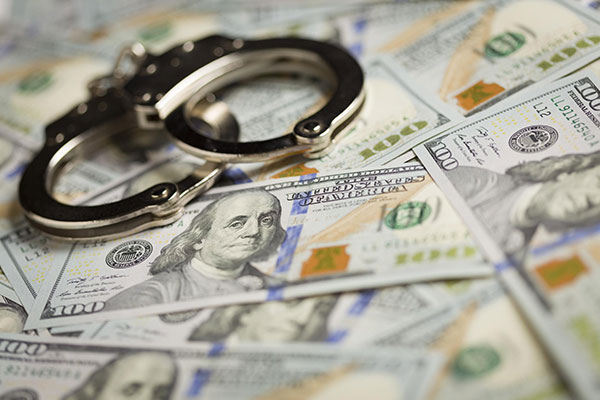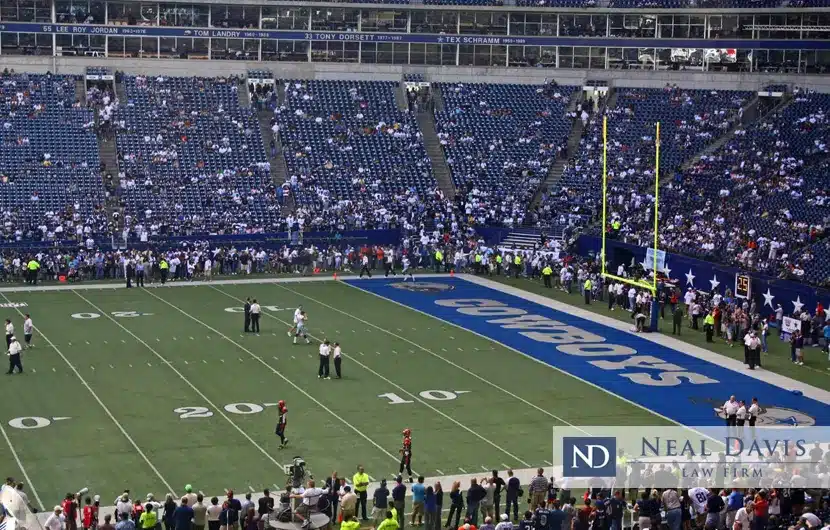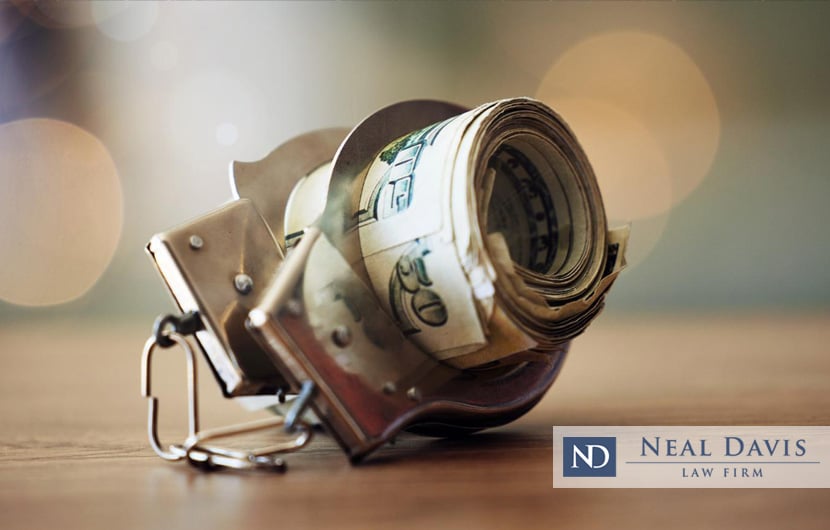Are you being investigated by the government for fraud?
Contact Neal Davis – an award-winning Houston defense lawyer skillfully defending individuals and companies from charges of securities fraud, investment fraud, financial schemes and other white collar crimes.
When talking about securities and investment fraud, one cannot help but think of Enron – an American energy company once based in Houston, Texas.
By exploiting certain accounting loopholes and engaging in poor auditing practices, Enron concealed billions of dollars in debt from shareholders and the Securities and Exchange Commision until filing for Chapter 11 bankruptcy in 2001 – making it the largest corporate bankruptcy in U.S. history at the time.
Upon investigation, many of Enron’s executives were indicted for various federal fraud crimes – including former CEO Jeff Skilling, who was tried and convicted on 35 counts of insider trading, securities fraud, conspiracy and other criminal white collar offenses. Skilling is now serving out his 24-year prison sentence and was forced to pay a fine of $45 million.

While the story of Enron and Skilling is one of the most infamous cases of investment fraud in America, it certainly isn’t the only one. The SEC and Department of Justice file hundreds of fraud charges against corporations, CEO’s, executives, brokers, analysts, employees and individuals each year. From 2006 to 2009, the number of pending securities fraud cases increased by 30 percent according to the FBI.
Facing a criminal securities fraud charge is serious.
Both your career and your freedom are on the line. The stakes couldn’t be higher.
It’s time to hire an experienced white collar defense lawyer who is serious about securing the best possible outcome in your case. Contact the Neal Davis Law Firm of Houston, Texas for aggressive legal representation now.
Schedule an AppointmentWhat is securities fraud?
Securities fraud, otherwise known as investment fraud or stock fraud, is an intentional and deceptive business practice that occurs when a company conceals or fabricates financial information to try to influence the purchasing behavior of investors and shareholders. The two primary federal laws which apply to the prosecution of securities fraud cases are the Securities Act of 1933 and the Securities Exchange Act of 1934 – though there are numerous other federal and state laws which may also come into play.
Securities fraud cases can come in many different shapes and forms, from outright embezzlement or theft from stockholders to offering high-risk financial schemes to unknowledgeable investors or lying to auditors. The following illegal actions are considered securities fraud and punishable as a criminal offense under federal law:
- Insider trading
- Front running
- Churning
- Boiler rooms
- Stock manipulation
- Misleading investors
- Stock embezzlement
- Misreported assets or debt
- False promises on investment returns
- “Dummy” corporations
- Corporate misconduct
- Microcap fraud
- Abusive short-selling
- Accountant negligence
- Ponzi schemes
- Pyramid schemes
- Financial “pump-and-dump” Internet scams
What agencies investigate securities fraud?
The U.S. Securities and Exchange Commission (SEC) is the primary federal authority that gets involved whenever corporate fraud is suspected. The SEC is also the enforcer of laws made by the government to protect against securities fraud, and the agency has extensive power to access a company’s financial information when conducting an investigation. If the SEC determines that securities fraud has been committed, the U.S. Department of Justice (DOJ) may be called in to prosecute the offender to the full extent of the law.
In addition to the SEC and DOJ, other federal and regulatory agencies that may conduct securities fraud investigations include:
- The Federal Bureau of Investigation (FBI)
- The Internal Revenue Service (IRS)
- The U.S. Postal Inspection Service
- The Commodities Futures Trading Commision
- The Treasury Department’s Financial Crimes Enforcement Network
- Local law enforcement
Is securities fraud a felony?
Yes. The federal government, along with most states, consider securities fraud and financial schemes felony offenses. Although securities fraud is a federal crime, each state’s individuals laws and securities commision may help determine sentencing. In addition to losing your job and derailing your career, a fraud conviction could land you up to 25 years in federal prison, heavy fines as well as civil court settlements and restitution awarded to the victims.
One important piece of legislation that comes into play during sentencing for securities fraud is the Sarbanes-Oxley Act of 2002.
Passed soon after the Enron scandal to improve the accuracy of financial reporting by publicly traded companies, the Sarbanes-Oxley Act effectively increased punishments for destroying, altering or fabricating financial records during a federal investigation or for the purposes of defrauding investors. The accountability of auditing firms was also increased by this law.
Below are prison terms of those recently found guilty of insider trading, securities fraud, investment fraud, mortgage fraud, Ponzi schemes and other financial crimes.
Robert Allen Stanford
110 Years
2012; orchestrating $7 billion investment-fraud scheme
Edward Woodard
23 Years
Concealing nonperforming assets at Bank of the Commonwealth, resulting in its collapse
Davis McMaster
15 Years, 6 Months
2013; $28 million bank fraud scheme
Joseph Braas
15 Years
2012; bank fraud conspiracy, closing the Bank of Lancaster County
Abdul Walji
12 years, 7 months
2013; defrauding 40 investors of $10 million
Matthew Kluger
12 years
2012; orchestrating insider-trading scheme
William Dean Chapman
12 years
2013; $270 million fraudulent stock loan scheme
Raj Rajaratnam
11 years
2011; orchestrating insider-trading scheme at Galleon Group
Zvi Goffer
10 years
2011; running insider-trading ring at Galleon Group
Shawn Portmann
10 years
2013; mortgage fraud scheme at Pierce Commercial Bank, resulting in bank’s collapse
Garrett Bauer
9 years
2012; orchestrating insider-trading scheme
Reniero Francisco
8 years, 1 month
2013; defrauding 40 investors of $10 million
Scott Powers
8 years
2013; $28 million bank fraud scheme
Anthony Chiasson
6 years, 6 months
2013; securities fraud and conspiracy to commit securities fraud
Todd Newman
4 years, 6 months
2013; securities fraud and conspiracy to commit securities fraud
Michael Steinberg
3 years, 6 months
2014; insider trading at SAC Capital Advisors
Thomas Hampton
2 years, 6 months
2013; concealing millions of losses in investment scheme
Paul Martin
2 years, 6 months
2013; high-yield investment fraud scheme at Bankers Trust
Source: Newsweek: Nonsensical Sentencing for White Collar Crimes
“Mr. Davis was referred to me by someone who has often seen Mr. Davis at work.From the beginning Mr. Davis was no-nonsense and straight forward. He got to work right away and kept me informed of whatever developments came about.His reputation, professionalism and tenacity gave me confidence for a positive outcome.At the end my case was dismissed. If I or someone I cared about were to be in need of criminal defense in the future Mr. Davis would definitely be my first call. -Avvo Review 2015”
Houston | Criminal Defense case
Verified Customer
Possible Defenses Against Securities Fraud & Financial Schemes
The “no knowledge” defense of the Exchange Act (Section 32(a)) says that “no person shall be subject to imprisonment under this Section (regarding penalties) for the violation of any rule or regulation if he proves that he had no knowledge of such a rule or regulation.”
To use the No Knowledge defense strategy in a securities fraud case, the defendant must prove they had no prior knowledge of SEC regulations or rules pertaining to their crime.
This burden of proof is a challenging criteria to meet, especially in today’s post-Enron court system which is quick to crack down on accused corporate fraud offenders. A criminal defense attorney can help greatly in this regard.
If you are being investigated by the SEC or DOJ for securities fraud, investment fraud or a financial scheme, it is imperative you act now to protect your rights. Consult our securities fraud defense attorneys before talking to authorities.
Contact Houston white collar defense attorney Neal Davis as soon as possible to discuss your defense strategy and hire experienced legal representation. With over 25 years of experience handling state and federal cases in Texas and across the nation, Neal has extensive knowledge of the Sarbanes-Oxley Act and federal fraud law, giving him unique insight into how to build a compelling defense strategy. Schedule an appointment to protect your rights today.






